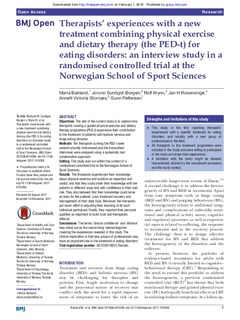| dc.contributor.author | Bakland, Maria | |
| dc.contributor.author | Pettersen, Gunn | |
| dc.contributor.author | Rosenvinge, Jan H. | |
| dc.contributor.author | Sundgot-Borgen, Jorunn | |
| dc.contributor.author | Wynn, Rolf | |
| dc.contributor.author | Stornæs, Annett Victoria | |
| dc.date.accessioned | 2018-05-18T12:02:56Z | |
| dc.date.available | 2018-05-18T12:02:56Z | |
| dc.date.created | 2018-02-01T14:17:36Z | |
| dc.date.issued | 2018 | |
| dc.identifier.citation | BMJ Open. 2018, 8, e019386. | nb_NO |
| dc.identifier.issn | 2044-6055 | |
| dc.identifier.uri | http://hdl.handle.net/11250/2498575 | |
| dc.description | This is an Open Access article distributed in accordance with the terms of the Creative Commons Attribution (CC BY 4.0) license, which permits others to distribute, remix, adapt and build upon this work, for commercial use, provided the original work is properly cited. See: http://creativecommons.org/licenses/by/4.0/ | nb_NO |
| dc.description.abstract | Objectives: The aim of the current study is to explore how therapists running a guided physical exercise and dietary therapy programme (PED-t) experience their contribution to the treatment of patients with bulimia nervosa and binge eating disorder. Methods: Ten therapists running the PED-t were semistructurally interviewed and the transcribed interviews were analysed using a systematic text condensation approach. Setting: The study was run within the context of a randomised controlled trial at the Norwegian School of Sport Sciences. Results: The therapists experienced their knowledge about physical exercise and nutrition as important and useful, and that they could share their knowledge with the patients in different ways and with confidence in their own role. They also believed that their knowledge could serve as tools for the patients’ post-treatment recovery and management of their daily lives. Moreover, the therapists put much effort in adjusting their teaching to fit each individual participant. Finally, they reported their personal qualities as important to build trust and therapeutic alliance. Conclusions: The terms ‘clinical confidence’ and ‘alliance’ may stand out as the overarching ‘metacategories’ covering the experiences revealed in this study. The clinical implication is that new groups of professionals may have an important role in the treatment of eating disorders. | nb_NO |
| dc.language.iso | eng | nb_NO |
| dc.subject | eating disorders | nb_NO |
| dc.subject | mental health | nb_NO |
| dc.subject | qualitative research | nb_NO |
| dc.title | Therapists’ experiences with a new treatment combining physical exercise and dietary therapy (the PED-t) for eating disorders: an interview study in a randomised controlled trial at the Norwegian School of Sport Sciences | nb_NO |
| dc.type | Journal article | nb_NO |
| dc.type | Peer reviewed | nb_NO |
| dc.description.version | publishedVersion | nb_NO |
| dc.rights.holder | © Article author(s) (or their employer(s) unless otherwise stated in the text of the article) 2018. All rights reserved. No commercial use is permitted unless otherwise expressly granted. | nb_NO |
| dc.source.journal | BMJ Open | nb_NO |
| dc.identifier.doi | 10.1136/bmjopen-2017-019386 | |
| dc.identifier.cristin | 1560716 | |
| dc.description.localcode | Seksjon for idrettsmedisinske fag / Department of Sport Medicine | nb_NO |
| cristin.unitcode | 150,34,0,0 | |
| cristin.unitname | Seksjon for idrettsmedisinske fag | |
| cristin.ispublished | true | |
| cristin.fulltext | original | |
| cristin.qualitycode | 1 | |
